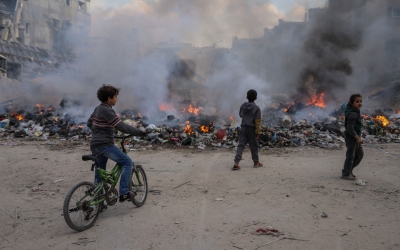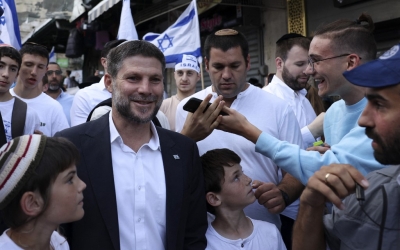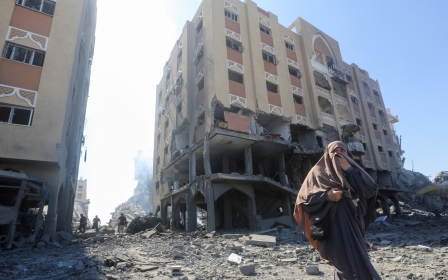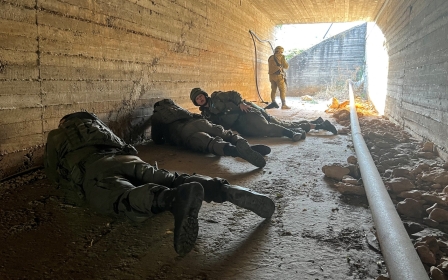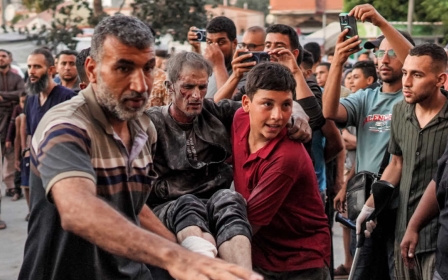Israeli ceasefire proposal does not guarantee Gaza war will end

Israel has not offered guarantees for a “permanent” ceasefire and a complete withdrawal from Gaza in its response to a plan presented by mediators, a copy of the proposal seen by Middle East Eye shows.
Israel instead agreed to a “temporary cessation of military operations” for 42 days, which would be followed by open-ended talks to reach a permanent ceasefire.
The “temporary ceasefire” would be extended after the initial 42-day phase “as long as negotiations on the conditions of stage two of [the] agreement are ongoing”, the document said.
The Israeli response also offers limited withdrawal of troops in the first phase of the three-stage agreement and says the complete pullout would take place in the second phase, which is subject to further discussions.
It also stipulates Israel can veto the release of at least 100 Palestinian prisoners serving life sentences in the first phase.
New MEE newsletter: Jerusalem Dispatch
Sign up to get the latest insights and analysis on Israel-Palestine, alongside Turkey Unpacked and other MEE newsletters
The document, revealed in full exclusively by MEE, is dated 27 May, four days before parts of it were presented by US President Joe Biden.
Biden dubbed it a "comprehensive" Israeli proposal for a "full and complete ceasefire" as he declared it was "time for this war to end”.
However, the draft is an Israeli counteroffer to a proposal mediated by the US, Qatar and Egypt on 6 May, which Hamas said it had agreed to.
Three key differences
Both proposals are made up of three six-week stages that begin with a temporary truce and a limited prisoner swap, and eventually lead to a permanent ceasefire and the release of all Israeli captives held in Gaza in exchange for Palestinian prisoners.
The Israeli counteroffer differs from the 6 May proposal, also seen by MEE, in three major ways.
First, there are differences over the form of the ceasefire as prisoner exchanges are worked out. Both proposals suggest talks should take place during the first phase to finalise details of the second phase.
The second phase in both proposals entails a declaration of “cessation of military operations and hostilities permanently”, full withdrawal of Israeli troops and the release of all remaining living Israeli captives in exchange for several Palestinian prisoners.
The initial proposal said talks would be aimed at finding an agreement over the number of Palestinians to be released for each male Israeli captive. It adds that the talks should be finalised within five weeks.
The Israeli response, however, adds that the temporary ceasefire in phase one would continue into phase two “as long as the negotiations on the conditions for implementing stage two of this agreement are ongoing”.
It adds: “The guarantors of this agreement shall make every effort to ensure that those indirect negotiations continue until both sides are able to reach agreement on the conditions for implementing stage two of this agreement.”
Second, the Israeli response puts limits on the type of Palestinian prisoners who can be released in the first phase.
The major restriction relates to Palestinians who are serving life sentences.
It agrees to release 50 prisoners, including 30 serving life sentences, for each female soldier released alive, as proposed on 6 May.
However, it says at least 100 prisoners in this category would be excluded from release in the first phase.
There are at least 550 Palestinians currently serving life sentences in Israeli jails, out of an estimated total of 11,800 prisoners.
Additionally, the Israeli proposal says at least 50 prisoners with a life sentence would be “released abroad or in Gaza”.
Third, the Israeli proposal removed mention of “lifting the siege” of Gaza, which was included in the 6 May draft.
It offers the “opening of the border crossings and facilitating movement of people and transfer of goods” instead.
MEE contacted the Israeli Ministry of Foreign Affairs for comment but did not receive a response.
Ongoing talks
Hamas has not yet given its official response to the Israeli offer.
Leaders of the Palestinian movement initially described Biden’s announcement of the proposal as “positive” but later expressed concern over the lack of commitment to a permanent ceasefire beyond the first phase.
The group’s leader, Ismail Haniyeh, said on Wednesday that Hamas would “deal seriously and positively with any agreement that is based on a comprehensive ending of the aggression and the complete withdrawal and prisoner swap”.
In Israel, details of the proposal revealed by Biden led to political tensions in Prime Minister Benjamin Netanyahu’s governing coalition.
Far-right ministers Itamar Ben Gvir and Bezalel Smotrich threatened to quit the coalition if the deal goes ahead, which would spark the government's collapse.
Amid mounting pressure, Netanyahu reportedly said the first phase of the deal could be undertaken without commitment to later stages.
He has repeatedly said in public he would not agree to end the war.
Meanwhile, CIA director William Burns landed in Doha on Wednesday for more talks.
He met with top Qatari and Egyptian officials who also held talks with Hamas leaders as discussions continued on Thursday.
Two Egyptian security sources told Reuters there are no sign of a breakthrough yet.
Middle East Eye delivers independent and unrivalled coverage and analysis of the Middle East, North Africa and beyond. To learn more about republishing this content and the associated fees, please fill out this form. More about MEE can be found here.


